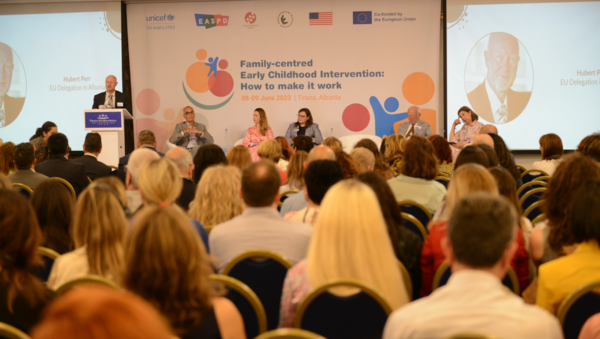Family-centred Early Childhood Intervention is the way forward for more inclusive communities

On 8-9th June, the European Association of Service providers for Persons with Disabilities (EASPD),UNICEF, Down Syndrome Albania and Help the Life Association co-hosted the international conference, “Family-centred Early Childhood Intervention: How to make it work” in Tirana, Albania. The conference highlighted the benefits of family-centred Early Childhood Intervention (ECI) for children at risk of developmental issues or disabilities, their families, and the wider community, with these services contributing to more inclusive, future-oriented societies. Together, EASPD and partners called on national policymakers to invest in strengthening their ECI systems and encouraged the European Union to support its Member States in this process.
Early Childhood Intervention (ECI) is a field of services for young children and their families, which help to identify, prevent, overcome, or minimise at-risk situations related to developmental issues or disabilities. ECI services place the child’s and family’s strengths at the heart of support, they build individualised support in partnership with the family, who are active participants in each aspect of the process. These services promote the well-being of children and families, contributing to the prevention of the placement of children in institutions and inclusion.
Bringing together over 300 participants, the conference focused on the necessity of moving toward a family-centred approach in ECI, looking at guiding principles, practical examples, and the systemic elements needed for this to happen.
Katarina Ivanković Knežević, Director for Social Rights and Inclusion at the European Commission, agreed on the importance of family-centred ECI and its role in achieving creating an equal Europe that leaves nobody behind. Speaking via video message Ms Ivanković Knežević reminded participants and policymakers of the European Child Guarantee Recommendations, which uphold the right of children and their families to have access to key services minimise social exclusion and promote equal opportunities for all children.
Comprehensive and integrated national ECI systems are necessary to ensure quality support for all families. A key challenge to the achievement of these systems is the lack of legislative frameworks and strategic plans to regulate, organise, and guarantee high-quality and sustainable ECI services. The conference provided an opportunity to highlight promising examples of the development of such systems in different countries.
Speaking at the event, Irene Bertana, Senior Policy Officer at EASPD, encouraged national governments to prioritise the development of national strategic plans to deliver integrated, family-centred ECI services. Highlighting the opportunities for EU support, she added: “In Greece, we are already seeing how tools such as the Technical Support Instrument can be used to implement reforms in ECI. I encourage Member States to work with the European Union to invest in creating systems that can provide critical support to vulnerable families as well as reduce pressure on public healthcare, education, and social protection services.”
Reflecting further on what more can be done to build and strengthen national ECI systems, Ivelina Borisova, Early Childhood Development Adviser at the UNICEF Regional Office for Europe and Central Asia said “UNICEF calls upon all partners to recognize the importance of supporting children with developmental difficulties from an early age. The evidence is clear: family-centred early childhood intervention has a powerful, positive impact on children, families, and communities. We are committed to collaborating with governments, academia, and civil society to build responsive national systems that meet the diverse needs of children and families. Together, we can create a future where every child thrives and every family is supported.”
The conference closed with EASPD and UNICEF committed to continuing their work to support and strengthen family-centred ECI systems. In the following weeks, the two organisations will launch their joint conference conclusions.
Supporting Documents
- Policy Paper-
Family-centred Early Childhood Intervention: The best start in life
- Conference Webpage-
Family-centred Early Childhood Intervention: How to make it work
- Project Webpage-
Emergency Early Childhood Development Support for Ukrainian Refugees
- Project Webpage-
For more information, please contact:
Irene Bertana, Senior Policy Officer, EASPD
Note to editors:
The European Association of Service providers for Persons with Disabilities is a non-profit European umbrella organisation, established in 1996, and currently representing over 20,000 social and health services for persons with disabilities. EASPD advocates effective and high-quality disability-related services in the field of education, employment and individualised support, in line with the UN CRPD principles, which could bring benefits not only to persons with disabilities, but to society as a whole.

